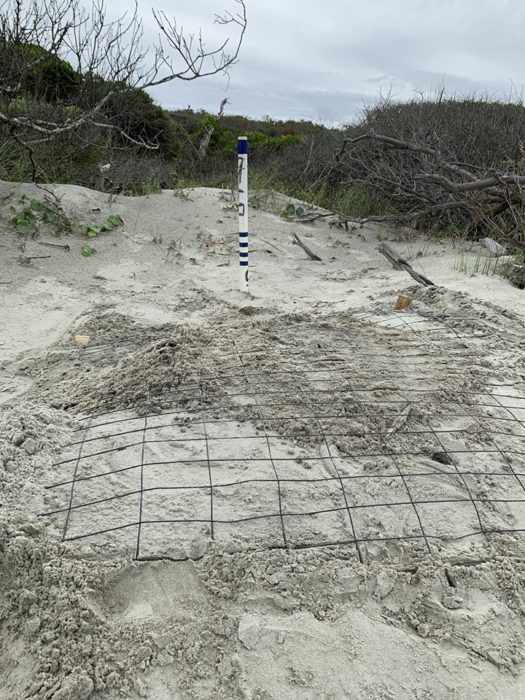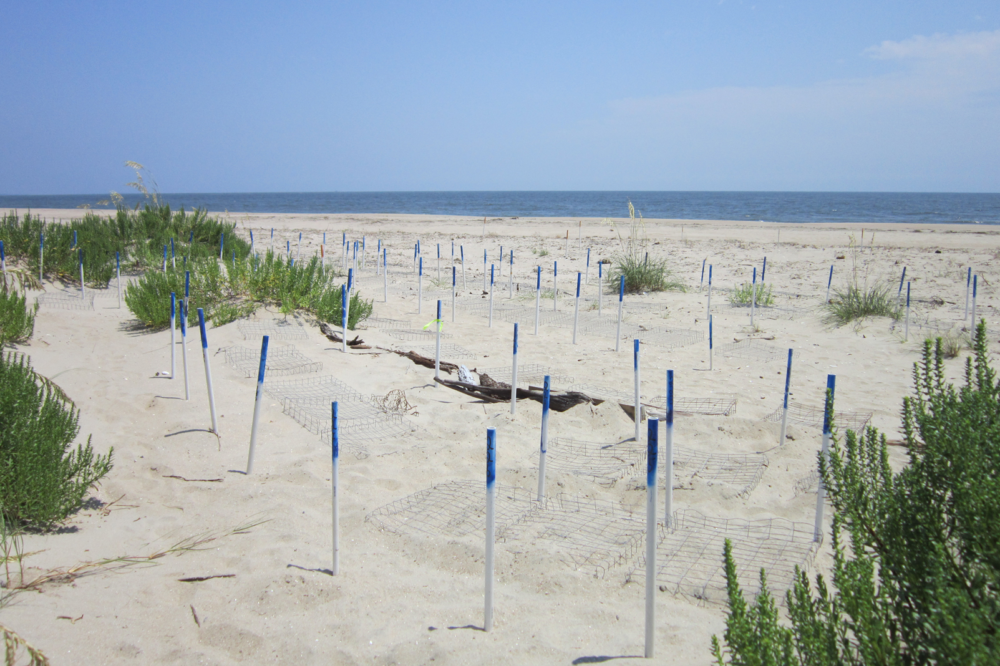Loggerhead sea turtle nesting at Cape Romain National Wildlife Refuge
Located just 15-20 miles from three of South Carolina’s four largest cities, Cape Romain National Wildlife Refuge is a 66,000-acre estuary haven for Over 293 species of birds, including seabirds, shorebirds, wading birds, waterfowl, and raptors. In addition, over 24 types of reptiles, 12 varieties of amphibians, and over 36 species of mammals call the refuge home. Cape Romain is recognized as a Western Hemispheric Shorebird Reserve of International Importance. The refuge is critical to many migratory bird species of conservation concern.
The refuge is also the most crucial nesting habitat for threatened loggerhead sea turtles north of Florida. The refuge may receive over 3,000 nests in a single season. During nesting season, crews work 12 plus hours a day, seven days a week. The work includes moving nests in danger of being washed over by high tides and protecting nests from predators. This work results in over a 75% increase in the number of hatchlings surviving to make it to the sea.

Although highly effective, nest protection efforts are highly labor-intensive. Each day new nests (up to 50 a day!) must be located, assessed, protected in place, or relocated and marked. There is a brief period for safely relocating eggs, and new nest sites are dug by hand. DNA samples are collected from each nest. These samples give invaluable information to guide future conservation efforts. Each nest is also inventoried after hatching, so the exact number of hatchlings can be documented.

Due to staffing cuts, the refuge currently has only one full-time staff member dedicated to this program.
Friends of Coastal South Carolina has been supporting this project for the last 18 years. We have funded seasonal full-time field technicians and interns, managed contract funds for predator control on nesting islands in the refuge, donated the time of our existing staff and often provided supplies and materials for the project.
Here are some things you might not know about sea turtles:
- Sea turtles are ancient species, having been on Earth since the time of the dinosaurs — about 110 million years.
- There are seven species of sea turtles on Earth. All are either threatened or endangered.
- Plastic pollution in our oceans is one of the leading causes of illness and death in sea turtles.
- Nesting beaches are rapidly being lost to rising seas and development.
- Loggerhead turtles are named for their broad, muscular heads. Their blunt jaws allow them to feed on hard-shelled prey, such as mollusks, whelks, and conch.
- Loggerhead sea turtles take over 30 years to reach breeding maturity.
- Around age 30, female loggerhead turtles return to the same nesting grounds where they hatched to lay their eggs, sometimes traveling over 12,000 km.
- The temperature during incubation determines the sex of hatchlings (think potential impacts of climate change!).
- Cape Romain National Wildlife Refuge is the most critical nesting area for threatened loggerhead sea turtles north of Florida. While the refuge contains 10% of the nesting habitat in South Carolina, it receives up to 40% of the state’s nests.
What we need to do to protect sea turtles (and much more!):
- Avoid using plastic. We need to be sure it is correctly disposed of so it doesn’t end up in the ocean when we do. How about reusable shopping bags?
- Use less outside lighting. Lights on the beach and the “glow” from adjacent cities disorients hatchlings trying to make it to the sea.
- Reduce our carbon emissions. Rising seas due to climate change are eroding nesting beaches, and oceans are warming and becoming more acidic impacting turtles’ food supplies.
Help protect thousands of nests right here at Cape Romain National Wildlife refuge by supporting Friends of Coastal South Carolina.
Dedicated to preserving the ecosystems and wildlife of the South Carolina coast for future generations, Friends of Coastal South Carolina supports our national forest and wildlife refuges through our education programs, advocacy work, and by supporting critical wildlife and habitat projects.
Friends of Coastal South Carolina is a 501( c)3 nonprofit organization. Gifts are tax-deductible to the fullest extent allowed by law.
